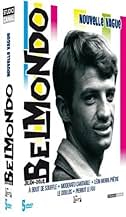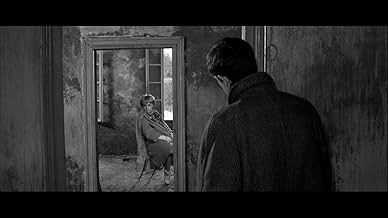IMDb RATING
6.9/10
1.4K
YOUR RATING
A wealthy, bored woman witnesses a murder in affection and meets another witness. She asks him about the history of the victim and falls in love with him.A wealthy, bored woman witnesses a murder in affection and meets another witness. She asks him about the history of the victim and falls in love with him.A wealthy, bored woman witnesses a murder in affection and meets another witness. She asks him about the history of the victim and falls in love with him.
- Awards
- 1 win & 1 nomination total
Featured reviews
Peter Brook acquired the rights to the successful Nouveau Roman 'Moderato Cantabile' from author Marguerite Duras as a vehicle for Jeanne Moreau with whom he had worked on stage in 'Cat on a Hot Tin Roof'.
Brook's previous film 'The Beggar's Opera' had hardly been a resounding success which made it difficult to get funding for this latest venture. However, thanks to the Herculean efforts of producer Raoul Levy the necessary funds came through.
Levy and his backers must surely have been disheartened by the films failure outside of France. Such a pity also that the film became lumbered with the ghastly alternative title of 'Seven Days....Seven Nights', the suggestiveness of which was obviously designed to get bums on seats.
Jeanne Moreau as Anne, the bored and unfulfilled wife of a rich industrialist, is attending a piano lesson at which her young son Pierre is struggling, under the stern eye of his piano teacher, to get to grips with the 'moderato cantabile' movement of a sonatina by Diabelli. They are interrupted by the blood-curdling scream of a woman in the bar next door who has presumably been murdered by her lover. Anne becomes intrigued by and obsessed with the crime and the reasons for it. She meets Chauvin, one of her husband's employees, who seems to offer an explanation and they begin what can only be described as a 'metaphysical' relationship which to Anne's despair, does not progress to the physical.......
This film comes within the Golden Age for stage-trained Jeanne Moreau that began with 'Lift to the Scaffold' for Louis Malle in 1957. Her performance here as Anne is utterly mesmerising and fully justifies her being described by Orson Welles as 'simply the greatest'.
As Chauvin Jean-Paul Belmondo is frankly miscast and by all accounts was bored and mystified by the whole enterprise. His instinctive talent and undeniable screen presence carry him through. Young Didier Haudepin is splendid as Pierre and would excel four years later in 'A Special Friendship', a forgotten masterpiece of Jean Delannoy. Colette Regis certainly makes an impression in her two scenes as Mlle Giraud the piano teacher.
The highlight of the film is the dinner party where Anne finally cracks, the direction of which by Brook is superlative. The final scene between Anne and Chauvin also leaves a deep impression.
Shot in lustrous black and white by Armand Thirard this is a compelling and haunting work the power of which lies in its restraint. Moreau's astonishing portrayal won her a Palme d'Or and the film itself marked the start of a long and fruitful collaboration with Marguerite Duras.
In 2001 she came full circle by playing Duras in 'Cet amour-la'.
Jeanne Moreau is with her son at a piano lesson. A fuss in the street alerts her that something is going on in the street. A woman has been killed in a nearby bar. She goes there and meets Jean-Paul Belmondo, who witnessed the event. They begin a brief affair.
Under the direction of Peter Brook we get one of Mlle Moreau's typically fine performances. The story, however, is very slight. We are to see the emptiness of her life, her indifferent husband, and his dull business associates at their haute-cuisine dinners, her lack of connection to anyone save her child. Her concern with the murder is an obvious issue, with its concerns about the evanescence of life. Yet that soon evaporates. Her inability to connect to another adult save through sex renders her as shallow as the dinner guests. The audience is held in suspense, hoping she will achieve something deeper.
Under the direction of Peter Brook we get one of Mlle Moreau's typically fine performances. The story, however, is very slight. We are to see the emptiness of her life, her indifferent husband, and his dull business associates at their haute-cuisine dinners, her lack of connection to anyone save her child. Her concern with the murder is an obvious issue, with its concerns about the evanescence of life. Yet that soon evaporates. Her inability to connect to another adult save through sex renders her as shallow as the dinner guests. The audience is held in suspense, hoping she will achieve something deeper.
This has to be one of the dullest films of the early Sixties. Remember that Godard, Malle, Truffaut and company had been challenging the traditions of story telling; the world seemed young again, and full of possibilities. Moderato cantabile has nothing of this spirit. It might have been made by an old-guard director like Clément or Delannoy (if they had decided to take a chance on a Duras script).
There isn't much energy or interest in this story: what happens in the first ten minutes is endlessly rehashed throughout the remainder. Belmondo is ill at ease here, or at least seems that way to me--there is no chance for any extroversion, exuberance or even anger from the character. Jeanne Moreau is used decoratively (Brook must have seen what Resnais was able to do with Delphine Seyrig in Last Year In Marienbad) and always looks elegant, if never really desperate or anguished. You know something's wrong when the piano teacher provides much of the dramatic interest: she's bullying the child into giving her a Diabelli sonata "moderately, with a singing feeling".
Note: I have just remembered that Clément did do a Duras script (Barrage contre le Pacifique) in 1958.
There isn't much energy or interest in this story: what happens in the first ten minutes is endlessly rehashed throughout the remainder. Belmondo is ill at ease here, or at least seems that way to me--there is no chance for any extroversion, exuberance or even anger from the character. Jeanne Moreau is used decoratively (Brook must have seen what Resnais was able to do with Delphine Seyrig in Last Year In Marienbad) and always looks elegant, if never really desperate or anguished. You know something's wrong when the piano teacher provides much of the dramatic interest: she's bullying the child into giving her a Diabelli sonata "moderately, with a singing feeling".
Note: I have just remembered that Clément did do a Duras script (Barrage contre le Pacifique) in 1958.
"Moderato Cantibile" was only the second film by the great British director Peter Brook and it proved, like Welles before him, that he was equally adept in either medium. It was made in France in 1960 and has now largely been forgotten, though at the time the magazine Films and Filming selected it as the best film of the year from any source and it's a masterpiece. It's also one of the most beautiful black and white films to be made in the Cinemascope format. (Armand Thirard was the DOP).
It's about a respectable,if unhappily married, woman in a grim little coastal town in France who drifts into an affair of sorts with a man from farther down the social ladder. They are played, magnificently, by Jeanne Moreau and Jean-Paul Belmondo. The oblique, brilliant screenplay is by Marguerite Duras and Gerard Jarlot from a novel by Duras and anyone remotely interested in cinema as an art-form should seek it out.
It's about a respectable,if unhappily married, woman in a grim little coastal town in France who drifts into an affair of sorts with a man from farther down the social ladder. They are played, magnificently, by Jeanne Moreau and Jean-Paul Belmondo. The oblique, brilliant screenplay is by Marguerite Duras and Gerard Jarlot from a novel by Duras and anyone remotely interested in cinema as an art-form should seek it out.
for the Duras's atmosphere. for the lead actors. for the story, landscapes, dialogs, the piano lesson or for its end. for the illustration of a state of soul as result of a mixture of sin, fear, high expectations and fall. a film about a woman and a man. all in simple manner presented. a town. and few meetings. and level of dark revelation. a film of silhouettes and silence. and it is enough for discover an universe who could be part from yourself. a film about choices. and about a strange form of music. Jeanne Moreau is not a surprise. Belmondo is the perfect choice despite the expectations about other actor if you read the novel. the result - not comfortable but good occasion for reflection. about love. and about versions of Madame Bovary.
Did you know
- TriviaAccording to biographer Olivier Todd, Peter Brook offered writer Albert Camus an acting job in Moderato cantabile. Camus died in a car accident before he could take it.
- GoofsIn original release copies the title card read "Moderato contabile", but they were not retired from circulation.
- Quotes
Anne Desbarèdes: Try to remember: Moderato means gently - it's nearly the same - and Cantabile means melodiously. It's easy.
- ConnectionsFeatured in Jeanne M. - Côté cour, côté coeur (2008)
- How long is Seven Days... Seven Nights?Powered by Alexa
Details
- Release date
- Countries of origin
- Language
- Also known as
- Stunden voller Zärtlichkeit
- Filming locations
- Production companies
- See more company credits at IMDbPro
- Runtime
- 1h 31m(91 min)
- Color
- Aspect ratio
- 2.35 : 1
Contribute to this page
Suggest an edit or add missing content
























